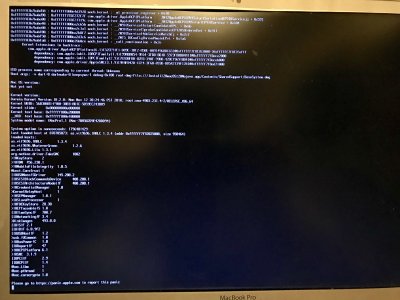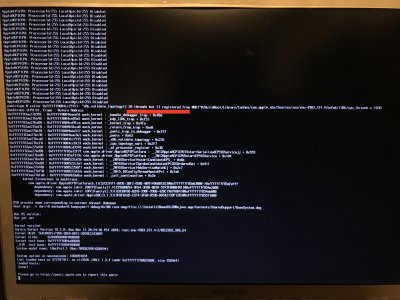kgp
Retired
- Joined
- May 30, 2014
- Messages
- 6,743
- Motherboard
- ASUS WS X299 Sage 10G
- CPU
- i9-7980XE
- Graphics
- Vega 64
- Mac
- Mobile Phone
@kgp I did implement my own TSCAdjustReset.kext, which I changed the IOCPUNumber to 19 (20 threads -1)
My setup:
Motherboard: Asus Prime X299 Deluxe II (latest BIOS version 0404)
CPU:i9-9820X (10 Cores 20 Threads)
GPU:GTX970 4GB / RX570&580 4GB
RAM:32GB Kingston DDR4 2666MHz
SSD: Sandisk A400 512GB
macOS USB Install Drive: Kingston DataTraveler 16GB
My BIOS setting screenshots are at #7
I mainly used your X299 EFI files to install macOS 10.13.6 and 10.14.2, and added AppleALC, Lilu, Whatevergreen, USBInjectAll, SmallTree-Intel-211-AT-PCIe-GBE and my ownTSCAdjustReset kext into the kext folder.
The EFI files now I am using are in the attachments but I am having the same KP with @dolgarrenan during the installation.
Thank you for your support in advance!!
Well flying over your BIOS settings and EFI-Folder, there is nothing really suspicious that could be the source of your kernel panics during early boot.
Are you observing the same KPs under both 10.13.6 and 10.14.2?
Note the following inconsistencies in your config.plist at least under 10.14.2.
a.) The USB port limit patch might not work at all. Thus even by using USBInjectAll.kext, most of your XHCI USB3.0 ports will be non-functional without any additional SSDT, where you explicitly define the 15 HS/SS ports to be implemented. I recommend to use in the meanwhile the truncated 15-port XHC USB kext for the Prime X299 Deluxe instead, which should be largely compatible also with the Prime X299 Deluxe II. Once you have a working build, I would like you to ask to do a USB port discovery and modify the fully implemented and truncated 15-port XHC USB kexts for the ASUS Prime X299 Deluxe for their use with the ASUS Prime X299 Deluxe II accordingly. The approach is easy and straight and might be a question of no more than 30 min of work to invest.
b.) Remove all USB entries in your config.plist under Section "devices" of Clover Configurator (uncheck "Inject" and "FixOwnership"). Also concerning Audio uncheck "AFGLowPowerState" and "ResetHDA". Also disable "LanInjection".
c.) Now the likely important part! In your config.plist under Kernel and Kext patches, xcpm_core_scope_msrs © Pike R. Alpha is enabled, although you disabled the MSR lock in your BIOS settings. Please disable xcpm_core_scope_msrs © Pike R. Alpha!
If your KP issues at early boot persist, try to play with the AVX and AVX-512 offsets.
Another issue might be the Sensor kexts, which might not be fully compatible with the Asus Prime X299 Deluxe II or the i9-9820X yet. Your KPs in a away point to that, although I would not really believe the Sensor kexts to be the source of your issue. You can remove all Sensor kexts for testing purposes. However, you will have to include some FakeSMC.kext though.
Take note that @izo1 repeatedly confirmed full compatibility of the ASUS Prime X299 Deluxe II and i9-7900X with my guide, including BIOS settings and EFI-Folder distribution. See e.g. but not only his recent post #1,208.
I therefore would not know any reason why your ASUS Prime X299 Deluxe II should behave differently.
There is a noob question though from my side:
I know about the Intel i9-99xx series. I never heard about an Intel i9-98XX series.. Can you explain me the difference between e.g. an i9-9920X and your i9-9820X, apart from the reduced core number, stock base frequency and stock turbo frequency? Maybe other differences with this CPU might be the source of your current issues?
Investigating https://ark.intel.com/products/189121/Intel-Core-i9-9820X-X-series-Processor-16-5M-Cache-up-to-4-20-GHz-, it says that the i9-9820X is rather a Skylake CPU than Skylake-X, which could imply some incompatibly with X299 and your ASUS Prime X299 Deluxe II.. Although investigating https://ark.intel.com/de/products/1...series-Processor-19-25M-Cache-up-to-4-50-GHz-, one finds similar statements and information and the i9-9920X is indeed fully compatible with X299 and the ASUS Prime X299 Deluxe II. Both the i9-9820X and i9-9920X are FCLGA2066 socket processors. Thus, also any incompatibly with X299 should be generally excluded. Maybe the i9-9820X is not yet considered in firmware 0404 for the ASUS Prime X299 Deluxe II, thus indeed some respective microcode still needs to implemented in the ASUS Prime X299 Deluxe II firmware?
Last edited:


